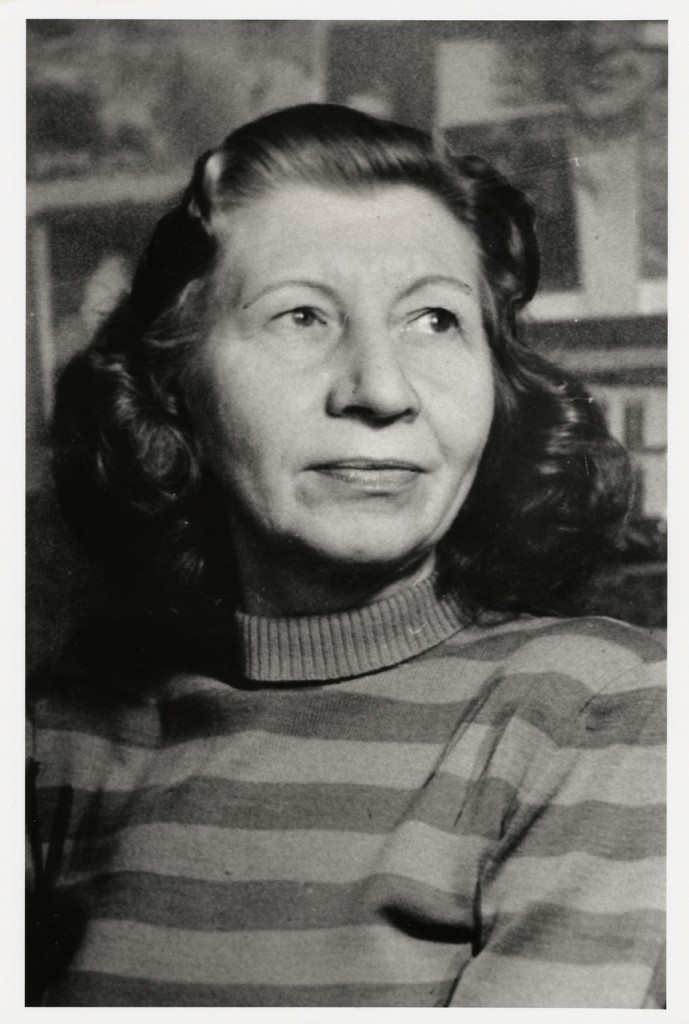

Queer Places:
Faucon, Departement du Vaucluse, Provence-Alpes-Côte d'Azur, France, Plot Turn right after entering, then left at first row encountered; grave on left.
 Violette Leduc (7 April 1907 – 28 May 1972) was a French author.
Violette Leduc (7 April 1907 – 28 May 1972) was a French author.
She was born in Arras, Pas de Calais, France, on 7 April 1907. She was the illegitimate daughter of a servant girl, Berthe Leduc and André Debaralle, the son of a rich protestant family in Valenciennes, who subsequently refused to legitimize her.[1] In Valenciennes, Violette spent most of her childhood suffering from poor self-esteem, exacerbated by her mother's hostility and excessive protectiveness. She developed tender friendships with her grandmother Fideline and her maternal aunt Laure. Her grandmother died when Leduc was a young child.
Her formal education began in 1913, but was interrupted by World War I. After the war, she went to a boarding school, the Collège de Douai, where she experienced lesbian affairs with her classmate "Isabelle", which Leduc later adapted into a novel, Thérèse and Isabelle. The novel was censored until 2000.[2] It was also during this time that she was introduced to what would become her first literary passions: the Russian classics, then Cocteau, Duhamel, Gide, Proust, and Rimbaud.
In 1925, Leduc embarked on an affair with her music instructor, Denise Hertgès. The affair was later discovered and Hertgès was fired over the incident.[3]
In 1926 Leduc moved to Paris, along with her mother and step-father, and enrolled in the Lycée Racine. That same year, she failed her baccalaureate exam and began working as a press cuttings clerk and secretary at Plon publishers later becoming a writer of news pieces about their publications.[4] She continued to live with Denise for nine years in the suburbs of Paris.
In 1942 she met Maurice Sachs - future author of Le Sabbat - and Simone de Beauvoir, who encouraged her to write. Her first novel, L'Asphyxie (In the Prison of Her Skin), was published by Albert Camus for Éditions Gallimard and earned her praise from Jean-Paul Sartre, Jean Cocteau and Jean Genet. Her friendship with Sachs is detailed in her autobiography La Bâtarde.[5]
In 1955 Leduc was forced to remove part of her novel Ravages because of sexually explicit passages describing lesbianism. The censored part was eventually published as a separate novella, Thérèse and Isabelle, in 1966. Another novel, Le Taxi, caused controversy because of its depiction of incest between a brother and sister. Critic Edith J. Benkov compared this novel with the work of Marguerite Duras and Nathalie Sarraute.[6]
Leduc's best-known book, the memoir La Bâtarde, was published in 1964. It nearly won the Prix Goncourt and quickly became a bestseller. She went on to write eight more books, including La Folie en tête (Mad in Pursuit), the second part of her literary autobiography.
In 1968 Radley Metzger made a film of Leduc's novel Thérèse and Isabelle.[7] The film was a commercial feature about adolescent lesbian love, starring Essy Persson and Anna Gael.
Leduc developed breast cancer and died at the age of 65 after two operations. She was living at Faucon, Vaucluse, at the time of her death.[8]
Violette is a 2013 French biographical drama film about Leduc, written and directed by Martin Provost.
My published books: